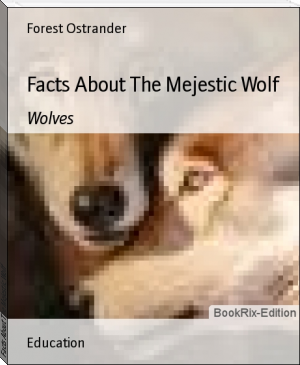Constelation History - Forest Ostrander (good books to read for teens txt) 📗

- Author: Forest Ostrander
Book online «Constelation History - Forest Ostrander (good books to read for teens txt) 📗». Author Forest Ostrander
constellation in a very prominent place in the sky.
According to Greek
mythology, Leo was a
ferocious lion who fell to
the earth in the forests of
Nemaea. He feasted on
the animals of the forest
and also caught and ate
many human beings. Many
brave men lost their lives
trying to kill this giant lion, for its skin was so tough that no arrow or spear
could pierce it.
Hercules was given the first of his Twelve Labors, that of killing the
terrible lion, by Hera the jealous wife of Zeus. She hoped that he would fail
and thus loose the love of his father, Zeus. Knowing that no spear or arrow
could pierce the lion’s skin, Hercules entered the lion’s cave and was able to
strangle the terrible lion. Hercules then reappeared at the cave’s entrance
wearing the lion’s skin as a robe. Hercules had saved the people of Nemaea.
This great act of heroism was commemorated by Zeus, when he placed the
picture of the defeated lion (Leo) in the night sky.
Libra is the only zodiacal constellation
that represents an inanimate object. Libra,
the scales, represents the equality of the
days and nights at the equinoxes. It has more
recently come to be associated with Virgo,
the goddess of justice, who used these scales
as a symbol of her office. Libra is
represented in the heavens next to the hand
of Virgo.
Lyra – The Lyre (Harp)
Lyra is the celestial harp
invented by Hermes, and given to
Orpheus by Apollo. It is said that when
Orpheus played on his harp, usually love
songs to his bride Eurydice, that people
and animals would stop what they were
doing just to listen. Some stories
relate how even the trees would cease
movement when he played. One day,
Eurydice died suddenly which broke
Orpheus’ heart. In his loneliness,
Orpheus attempted to win her back
from Hades, ruler of the underworld. Orpheus began his descent into the
underworld playing his lyre. As he approached Hades, he was pleased to see
that Hades greatly enjoyed his music. After a while, Orpheus stopped playing
his music. Hades asked him to resume playing the beautiful love songs on his
lyre. Orpheus agreed on one condition: that when he had finished, Hades would
release his beloved Eurydice to him. Hades agreed, and Orpheus again began to
play. At the conclusion of his music, Orpheus asked Hades for his wife. Hades
replied that she would indeed be released on one condition: that Orpheus would
trust Hades to keep his word and would return to the upper world playing his
music, not ever looking back to see if she were following. If Orpheus doubted
or did not trust Hades and looked back, Eurydice would be taken back by Hades
into the underworld. So Orpheus began his return trip playing his music.
Behind him he could hear the footsteps of Eurydice, which thrilled him greatly.
However, to test Orpheus’ trust, the return route Hades insisted on lead
through a pine grove. As Orpheus approached the upper world he passed
through this pine grove, but he could not hear the footsteps of his beloved
Eurydice. Unable to endure the quiet any longer, Orpheus glanced over his
shoulder to witness Eurydice fade before his gaze, taken by Hades back to the
underworld.
Upon Orpheus’ death, Zeus placed the constellation Lyra into the heavens
in honor of his beautiful music and also to honor the great love Orpheus had for
Eurydice.
With his great skill as a hunter,
Orion provided meat each day for the
gods’ meals. One day, Artemis (Diana), the
moon goddess and goddess of the hunt,
asked if she could accompany Orion on his
daily hunt. He readily agreed. The next
day as they were hunting in the woods,
they saw a deer. Orion carefully fitted an
arrow to his bow and shot. So sure was his
shot that the deer died instantly, which
pleased Artemis greatly. At dinner that
evening, Artemis told everyone, even Zeus,
of Orion’s great ability with the bow. All
of the praise extremely pleased Orion, who
vowed to impress Artemis even more the
next day.
Arising at dawn, Orion proceeded again to the forest where he shot
every animal he found. He then made a large pile of these animals near the door
to Artemis’ house. Then, knocking on her door, he asked her to come outside
and see the great surprise he had for her. Upon seeing the great pile of dead
animals, Artemis was horrified! For you see, Artemis was also the protector of
animals and punished those who killed more than they could eat. In her anger,
she stomped her foot on the ground and out of the dust came a great scorpion
which stung Orion on the heel causing him to die in great pain. But in honor of
his great service to the gods, Zeus placed his constellation in the sky.
In mythology, Pegasus sprang
from the spilled blood of the Medusa,
which dripped into the ocean after she
was slain by Perseus. Pegasus then flew
off into the sky. Returning to earth
later and eventually tamed by Minerva,
Pegasus was given to Bellerophon to aid
him in conquering the monster Chimera.
Bellerophon was successful in
destroying the monster. He then attempted to fly, riding Pegasus, up to Mount
Olympus to live with the gods. Zeus, angered by the presumption of
Bellerophon, made an insect sting Pegasus causing him to buck Bellerophon off,
who fell to his death.
Pegasus continued his flight up to Mount Olympus and was used in several
missions to defeat evil aggressors.
In honor of his great service, Zeus placed his constellation among the
stars.
The story of
Perseus is probably one of
the best known of the old
Greek myths. This hero
was the son of Zeus and
Danae. His mother and he
were locked in a wooden
box by his grandfather,
Acrisius, and thrown out into the sea to perish. However, the box did not sink,
but floated to the shore of another land. When the lid of the box was opened,
golden sunlight filled the box and Danae, holding the baby Perseus, stepped out
of the box. The king of that country, Polydectes, immediately fell madly in love
with her and wanted her to marry him. However, she would not marry him, for
she wanted to spend her full time taking care of Perseus.
When Perseus had grown into a young man, Polydectes tricked him into
agreeing to go on a mission for him. The mission was so dangerous that
Polydectes was sure that Perseus would be killed. With Perseus out of the way,
Danae would be forced to marry him. In order to prove himself, Perseus would
have to go to the cave of the gorgons and kill the Medusa by cutting off her
head and bringing it back as proof.
The next morning, Perseus went up to the top of a mountain and sang
songs to welcome the rising sun. This so pleased the gods that





Comments (0)